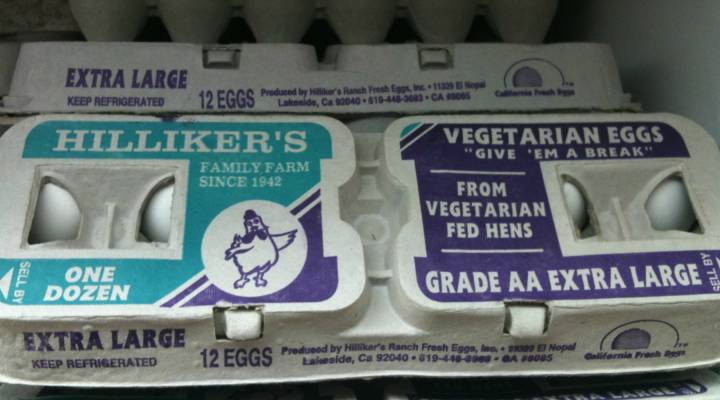
What’s up with eggs from vegetarian hens?

If you go to the grocery store to get something as simple as eggs these days… you might have a hard time making a choice. Should you get those marketed as “farm fresh?” Ones from hens that are “cage-free?” Or how about eggs labeled “vegetarian-fed?”
“I try to find something that is either locally or more sustainably grown or more friendly to the animals,” said Philip Wahlberg, a shopper at Kowalski’s Market on Grand Avenue in St. Paul, Minn.
At some point, Wahlberg decided the best choice would be eggs from vegetarian-fed hens, which were about in the middle of the price range of eggs where he usually shops. But he admitted that he wasn’t sure the “vegetarian-fed” label delivered the virtues he was hoping for.
It turns out the label doesn’t mean much in isolation.
Producers used to feed hens more animal byproducts. But that practice fell out of favor around the time of mad cow disease in the 1990s, according to Paul Patterson, a poultry science expert at Pennsylvania State University.
“There’s probably very few that are fed any animal products,” Patterson said.
Today, most commercial egg laying hens are fed a vegetarian, corn and soybean-based diet, even though they are not naturally vegetarians.
“Once they’re free-ranging and outside, they’re going to eat anything and everything they find,” said David Bruce, director of the egg division at Organic Valley.
He said producers in Organic Valley’s co-op provide their hens vegetarian feed. But that’s not a big marketing point for them. Their cage-free birds are free to also eat bugs and worms when they go outside. Bruce says at Organic Valley, the birds get true outdoor access — not just a screened-in porch, which some organic producers offer.
The phrase “vegetarian-fed” alone would not tell you if the hens are cage-free or have outdoor access, which are features consumers care about most.
“It’s so easy for someone to market to somebody like me who wants something better, but doesn’t have the time to do the research on what everything means,” said Philip Wahlberg.
After doing a bit of research, Wahlberg said he recently stopped buying eggs with the “vegetarian-fed label.” Now he’s paying a bit more for cage-free eggs, hoping that’s a better choice.
Editor’s Note: This version of the story clarifies that David Bruce did not say Organic Valley chickens might eat mice. A poultry expert told us that hens sometimes do.
There’s a lot happening in the world. Through it all, Marketplace is here for you.
You rely on Marketplace to break down the world’s events and tell you how it affects you in a fact-based, approachable way. We rely on your financial support to keep making that possible.
Your donation today powers the independent journalism that you rely on. For just $5/month, you can help sustain Marketplace so we can keep reporting on the things that matter to you.


















